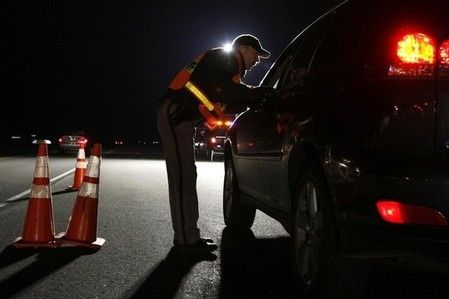Advertisement
U.S. top court limits drunken-driver refusal laws

By Lawrence Hurley
WASHINGTON (Reuters) – States can force suspected drunken drivers to take breath tests without first obtaining a warrant but cannot require them to take a more invasive blood test, the U.S. Supreme Court said on Thursday in a ruling that impacts laws in 11 states.
The court decided 7-1 that states cannot criminalize the refusal to take a blood test without a warrant, but also ruled 6-2 that it was acceptable for states to punish the refusal to take a breath test.
Lawyers for three defendants convicted of refusing to take tests in North Dakota and Minnesota had argued that the laws in those states violated the U.S. Constitution’s Fourth Amendment, which prohibits unlawful searches and seizures, because police did not have to obtain warrants first.
“Because breath tests are significantly less intrusive than blood tests and in most cases amply serve law enforcement interests, we conclude that a breath test, but not a blood test, may be administered as a search, incident to a lawful arrest for drunk driving,” Justice Samuel Alito wrote on behalf of five justices in the majority on both elements of the ruling.
The Foundation for Alcohol Responsibility, a group funded by leading distillers that campaigns against drunken driving, criticized the ruling.
“Striking down criminal penalties for test refusal will result in more refusals, more plea bargains and tougher cases for prosecutors,” the group’s president, Ralph Blackman, said in a statement.
Justice Clarence Thomas voted in favor of warrantless blood and breath tests, while Justices Sonia Sotomayor and Ruth Bader Ginsburg said both tests required warrants.
Lower courts had upheld the North Dakota and Minnesota laws.
Under the Minnesota law, a conviction could lead to as much as seven years in prison and a fine of up to $14,000. In North Dakota, an initial refusal to take a test is a misdemeanor offense.
The Supreme Court in 2013 also limited the ability of police to take involuntary blood samples from suspected drunken drivers without a search warrant.
About 10,000 people were killed in the United States in alcohol-related vehicle crashes in 2014, the most recent year for which there are government statistics, accounting for nearly a third of all traffic-related deaths.
(Reporting by Lawrence Hurley; Editing by Will Dunham)

